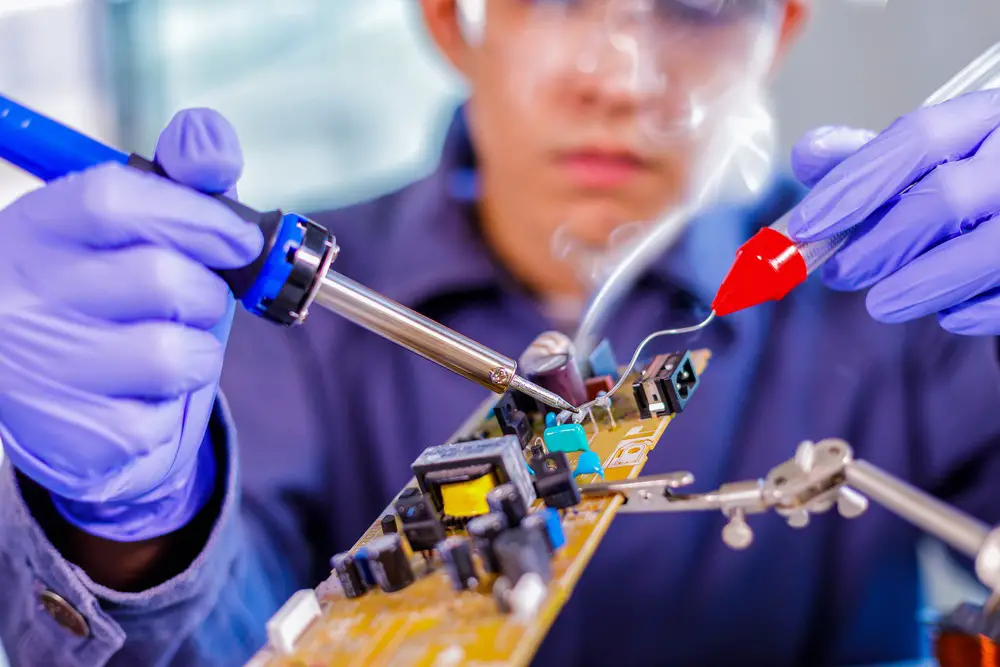A soldering iron isn’t only used for electrical repairs. It is a handy tool for jewelers, plumbers, metal workers, roofers, among other users. Plumbers, for example, use solder and propane torches to join copper pipes while electronic technicians use the heating tool to repair circuit boards.
As such, different types of solder and irons have been developed for the varying applications. For a long time, lead has been the primary component of solder. However, since it was found to be a health hazard, it has been eliminated from most solder components.
Modern solder constitutes tin and lead. Jewelry applications, for example, use solder with a high content of silver while electricians require solder with a high content of tin. Roofing applications, on the other hand, need a 50/50 ratio of the components to affix the pieces of metal.
Here’s a roundup of the different uses of a soldering iron:
Repairing Roofs
Soldering irons are used to join galvanized metals for flashing and joining sections of metal gutters. The most suitable devices for this application are gas-powered soldering irons due to the windy nature of roof repair.
Some experts also recommend using broad-tipped irons which heat up fast and can retain heat even in windy conditions. Solder applied on roofing parts dries up fast to form waterproof joints quickly.
Auto Repairs
Most auto repair applications involve the use acetylene torches and large-scale welding methods. However, soldering irons are used for small auto tasks as the metal used is soft.
The iron is used to tighten joints, fill irregular cavities, smooth out rough edges and repair electrical systems. Additionally, the iron is used to tin edges of the metal sheets, fuse metal panels when performing auto body repaires and filling up holes.
Plumbing Repairs
Soldering irons are ideal for making quick repairs to copper pipes. Lead-free solder is used to avoid exposing users to toxic materials.
Propane torches are used for repairs instead of the regular soldering iron but pipes that are hard-to-reach need soldering pens. Experts recommend using the roofer’s soldering gun as the tip does not heat up until the trigger is depressed.
Artsy Applications
Soldering irons are also used to create mosaics or stained glass windows. Traditionally, artisans used lead-based solder for these artsy applications but they have since moved to lead-free solder.
A 100-watt soldering iron is used to join the separate parts of colored glasses. The iron is also ideal for performing quick repairs where pieces of glass have become loose. You also need safety glasses, copper tape, a glass grinder and a wooden work surface for this project.
Perform Home Projects
Soldering irons, guns and pencils are ideal for a range of home projects including making circuit board repairs as they need varying amounts of heat. Most home soldering applications use electrical irons and are often used along with a propane torch. Be sure to keep the tool tips clean if not in use.
Solder Metal Gutters
Metal gutters are joined using soldering irons. The tools for this project are similar to those used by roofers to join metal pieces. The resulting solder joint is permanent and leakproof.
Solder Vacuum Tubes
Vacuum switches are soldered to insulate housing parts and form sealants. Copper parts, for example, are soft-soldered without putting the tube at risk. Silver tine solder is applied on a pre-fab vacuum tube to form a corrugated ring creating a tight vacuum on the circuitry board where the tube is attached.
Solder Plastic Circuit Boards
Wires on these boards are connected using solder to establish electric continuity. A solder pencil is ideal for this task as joints on the circuit boards are very small and require much precision. The pencils also enable users to control the temperature.
Electrical Applications
Electricians use solder to splice wires when performing commercial and residential wiring projects as it ensures electrical continuity. They also use it to connect the wires to electrical terminals in the control panels and electrical devices.
Jewelry Trades
Jewelers use soldering irons and pens that have interchangeable tips to attach jewelry components. Solder for this application has a high percentage of silver and jewelers often use borax flux to remove metal oxides that deter efficient transfer of heat.


